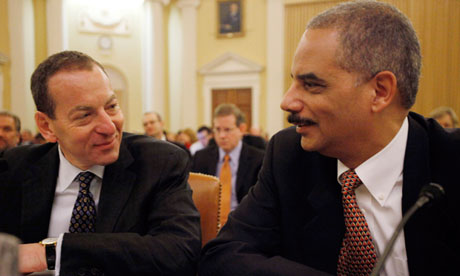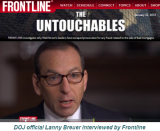(Please consider making a contribution to Welcome to Pottersville2 or sending a link to your friends if you think the subjects discussed here are worth publicizing. Thank you for your support. I really appreciate it. Any contribution will make a huge difference in this blog's ability to survive.)
The important thing to remember is that the MONEY never came from ANY of the parties in the sham securitization chain starting with the originator. While there are exceptions - like World Savings - the truth defeats further claims regarding the Wachovia acquisition and then the Wells Fargo acquisition of Wachovia. Either the assignments were missing or they fabricated and forged.
. . . But the institutionalization of hypocrisy and deviant behavior on the part of the Banks has left us with "settlements" that settle nothing, leaving millions of homeowners who lost their homes to entities that received a windfall from the foreclosure process and the windfall from dual tracking "modification" reviews that were a pure sham designed only to get the homeowner in the deepest hole possible so that foreclosure would become inevitable.
It's hard to delineate the fraud any more clearly.
And yet, although millions were victimized (and many thrown out of their houses and into the street) none of the victimizers were given any penance except for small fines.
No skin off of their hides was ever exacted.
BANK AMNESTY AGAIN: Leaving Consumers to Fend (Litigate) for Themselvesby Neil Garfield |
"To someone who lost his house to mortgage servicer incompetence or malfeasance, that's not restitution. It's an insult. "The capped pool of cash payments is wholly inadequate in light of the scale of the harm," says Alys Cohen, staff attorney for the National Consumer Law Center." Adam Levin, abcnews.com
Editor's Analysis: In case after case across the country it is readily apparent that there complete strangers making claims on mortgages, foreclosing, evicting and even collecting "Trial Payments" while they intend to do nothing other than Foreclose - because that is where the money is and because it is only through a foreclosure that they cap the losses and pass them onto investors despite having received large scale payments of insurance and other hedges.The Banks have it their way despite the obvious unconscionable, illegal, immoral and unethical breach of trust between consumer and bank and between banks.Whether it is the Chase WAMU deal, or the BOA countrywide deal, or the Indy-mac One West deal, the facts are in - we don't need to theorize anymore - the banks are NOT the creditors, they cannot shows proof of loss, proof of payment or any financial transaction that would entitle them to enforce an invalid note or foreclose on an invalid, unperfected mortgage lien.But the institutionalization of hypocrisy and deviant behavior on the part of the Banks has left us with "settlements" that settle nothing, leaving millions of homeowners who lost their homes to entities that received a windfall from the foreclosure process and the windfall from dual tracking "modification" reviews that were a pure sham designed only to get the homeowner in the deepest hole possible so that foreclosure would become inevitable.At our members conference this Wednesday, we will talk about what is getting traction in the modification of mortgages and what is getting traction in the litigation of mortgage disputes.The important thing to remember is that the MONEY never came from ANY of the parties in the sham securitization chain starting with the originator. While there are exceptions --- like World Savings --- the truth defeats further claims regarding the Wachovia acquisition and then the Wells Fargo acquisition of Wachovia. Either the assignments were missing or they fabricated and forged.If you ask yourself why they wouldn't have had the assignments done all nice and proper which is the way the banking world works when BORROWERS must sign documents, you will feel uncomfortable with Wall Street explanations of volume causing the paperwork confusion. It was the exact same volume that produced millions of "originated" mortgages where the i's were dotted and T's were crossed ---- that is, where the Borrower had to sign. The banks had no trouble then --- it was only when the banks had to sign that there was a problem. Where the securitization participants had to sign was neither disclosed nor drafted nor executed.The simple reason is that there was nothing to sign. There was no financial transaction where money exchanged hands which is why I am pounding on the point that the lawyers should be aiming at the money rather than the documentation. "For value received" means that value was paid or transferred. When you ask for the wire transfer receipt or cancelled check that shows payment and which would establish proof of loss, you are asking to see the transaction upon which the banks place all their reliance.Their argument that they don't need to show the actual transaction is a dodge to protect themselves from showing that the transactions in the bogus securitization scheme were all a sham. Your argument should be simple --- they say they lost money and that the homeowners owes it. Let's see the actual proof that they made the loan, lost the money and have not already been paid. The assignments are not accompanies by actual money exchanging hands which means that the assignment lacked consideration and was therefore an executory contract at best, pending payment.Then you need to ask yourself why there was no consideration when you know that money was funded from somewhere for a loan to the "benefit" of your client (albeit based upon fraud in the execution and fraud in the inducement including appraisal fraud). YOU must tackle the basic issue in the mind of just about every judge --- as long as the money was there at the "closing" of the loan, and the borrower signed the papers, and then defaulted on those promises, what difference does it make whether some OTHER papers were fabricated or even forged.The fact remains, your client, in the eyes of the Judge, got the loan, agreed to the terms and then defaulted. In our world, when you default on a loan, judgment is entered, foreclosure is completed and eviction, if necessary proceeds. The banks have relied upon this perception for years which considerable success. The reason borrowers often lose in litigation is that they arguing about the wrong thing. As soon as they go after the documentation first they are going down a rabbit hole. It is a tacit admission that the loan was valid, the note is evidence of the loan and the mortgage secures the note. DENY and DISCOVER puts that front and center as an issue of fact in dispute.By going after the money transactions and requiring proof of payment and proof of loss and asking for the accounting data that shows the loan receivable on the books of an entity, you are striking at the heart of the sham transaction.If you ask me for a loan for $100 and I say "Sure, just sign this note," and you go ahead and sign the note, what happens when I don't give you the $100 loan. The answer, which has caused considerable confusion in the foreclosure defense world is that I can nonetheless sue you (on its face the note LOOKS like a negotiable instrument) , but I can't win. Because if you deny that I ever completed the loan transaction by funding the loan to you, then I have to prove that I gave you the money. I can't because I didn't. My argument that you did receive a loan that day and therefore you owe me the money is a lie. You owe the money to whoever actually gave you the money.At the closing of these loans originated by nominees with no power to touch the money and whose only source of income was fees, not interest on the loan, the borrower was fooled by the fact that the money showed up for the loan. It never occurred to the borrower to ask any questions since the paperwork, and all the disclosures required by law told him a story about the loan. The borrower could not possibly know that the story told by the documents, the documents he or she signed at closing were all a lie.The Banks will take the position that everyone was authorized to make representations and act for everyone else --- except when it comes to paying down the debts with money received from insurance and the proceeds of credit default swaps, federal bailouts etc. In THAT case the bank says it was not the agent of the investors and had no duty to either the investor or the borrower since the banks were the named insureds --- made possible only because they purposefully put the name of a nominee on the note, a nominee on the mortgage (or even two nominees on the mortgage) so that the banks could open up a window of time during which they could claim ownership of the loans despite the fact that they had not funded one dime to originate or purchase any loan.Thus if go for the money first and THEN show the the fabrication, forgery and perjury in documents, the case makes sense and can be presented to the court without giving one inch of admission that the loan, the note or mortgage were real, valid or enforceable. AND by sending a standard QWR and FDCPA letter, the banks have nowhere to hide. In litigation the motion becomes a petition to enforce the RESPA 6 inquiry and the FDCPA inquiry either through direct order or through discovery.THEN you force the disclosure of the identity of the creditor who actually has a negative account balance on their books for the loan, directly or indirectly, and seek modification or settlement based upon the facts of the case. HAMP modification is impossible, settlement is impossible without first establishing who could submit a credit bid at auction or who could execute a valid satisfaction and release of the debt.
Fraud Is The Biggest Bubble In History http://www.ritholtz.com/blog/2013/01/fraud-is-the-biggest- bubble-in-history/
Neil Garfield | January 28, 2013
At least we can always depend on Russ Baker and Glenn Greenwald to roll back the fraud film.
Literally forcing me to remember Mussolini's finale.
PODCAST with Russ Baker on CIA Nominee John Brennan
By James Huang on Jan 19, 2013


Russ Baker interviewed by Pat Thurston of the major West Coast station KGO. They discuss disturbing aspects of CIA director-designee John Brennan; inconsistencies in what we have been told about the Abbottabad Raid that, we are told, bagged Osama bin Laden; the peculiar breaching of Obama’s passport records; the JFK assassination, propaganda, and more.
Please CLICK HERE to download/play the mp3 file.
The Untouchables: How the Obama Administration Protected Wall Street from Prosecutions
A new PBS Frontline report examines a profound failure of justice that should be causing serious social unrest
Guardian.co.uk,
Eric Holder talks to DOJ Criminal Chief Lanny Breuer in 2010. (Photograph: Jason Reed/Reuters)(updated below)
PBS' Frontline program on Tuesday night broadcast a new one-hour report on one of the greatest and most shameful failings of the Obama administration: the lack of even a single arrest or prosecution of any senior Wall Street banker for the systemic fraud that precipitated the 2008 financial crisis: a crisis from which millions of people around the world are still suffering. What this program particularly demonstrated was that the Obama justice department, in particular the Chief of its Criminal Division, Lanny Breuer, never even tried to hold the high-level criminals accountable.
What Obama justice officials did instead is exactly what they did in the face of high-level Bush era crimes of torture and warrantless eavesdropping: namely, acted to protect the most powerful factions in the society in the face of overwhelming evidence of serious criminality. Indeed, financial elites were not only vested with impunity for their fraud, but thrived as a result of it, even as ordinary Americans continue to suffer the effects of that crisis.
Worst of all, Obama justice officials both shielded and feted these Wall Street oligarchs (who, just by the way, overwhelmingly supported Obama's 2008 presidential campaign) as they simultaneously prosecuted and imprisoned powerless Americans for far more trivial transgressions. As Harvard law professor Larry Lessig put it two weeks ago when expressing anger over the DOJ's persecution of Aaron Swartz: "we live in a world where the architects of the financial crisis regularly dine at the White House." (Indeed, as "The Untouchables" put it: while no senior Wall Street executives have been prosecuted, "many small mortgage brokers, loan appraisers and even home buyers" have been).
As I documented at length in my 2011 book on America's two-tiered justice system, With Liberty and Justice for Some, the evidence that felonies were committed by Wall Street is overwhelming. That evidence directly negates the primary excuse by Breuer (previously offered by Obama himself) that the bad acts of Wall Street were not criminal.
Numerous documents prove that executives at leading banks, credit agencies, and mortgage brokers were falsely touting assets as sound that knew were junk: the very definition of fraud. As former Wall Street analyst Yves Smith wrote in her book ECONned: "What went on at Lehman and AIG, as well as the chicanery in the CDO [collateralized debt obligation] business, by any sensible standard is criminal." Even lifelong Wall Street defender Alan Greenspan, the former Federal Reserve Chair, said in Congressional testimony that "a lot of that stuff was just plain fraud."
A New York Times editorial in August explained that the DOJ's excuse for failing to prosecute Wall Street executives - that it was too hard to obtain convictions - "has always defied common sense - and all the more so now that a fuller picture is emerging of the range of banks' reckless and lawless activities, including interest-rate rigging, money laundering, securities fraud and excessive speculation."
The Frontline program interviewed former prosecutors, Senate staffers and regulators who unequivocally said the same: it is inconceivable that the DOJ could not have successfully prosecuted at least some high-level Wall Street executives - had they tried.
What's most remarkable about all of this is not even Wall Street had the audacity to expect the generosity of largesse they ended up receiving. "The Untouchables" begins by recounting the massive financial devastation the 2008 crisis wrought - "the economy was in ruins and bankers were being blamed" - and recounts:
"In 2009, Wall Street bankers were on the defensive, worried they could be held criminally liable for fraud. With a new administration, bankers and their attorneys expected investigations and at least some prosecutions."Indeed, the show recalls that both in Washington and the country generally, "there was broad support for prosecuting Wall Street." Nonetheless: "four years later, there have been no arrests of any senior Wall Street executives."
In response to the DOJ's excuse-making that these criminal cases are too hard to win, numerous experts - Senators, top Hill staffers, former DOJ prosecutors - emphasized the key point: Obama officials never even tried. One of the heroes of "The Untouchables", former Democratic Sen. Ted Kaufman, worked tirelessly to provide the DOJ with all the funds it needed to ensure probing criminal investigations and even to pressure and compel them to do so.
Yet when he and his staff would meet with Breuer and other top DOJ officials, they would proudly tout the small mortgage brokers they were pursuing, in response to which Kafuman and his staff said: "No. Don't show me small-time mortgage guys in California. This is totally about what went on in Wall Street. . . . We are talking about investigating senior level Wall Street executives, even at the Board level". (The same Lanny Breuer was recently seen announcing that the banking giant HSBC would face no criminal prosecution for its money laundering of funds for designated terrorist groups and drug networks on the ground that the bank was too big to risk prosecuting).
As Kaufman and his staffers make clear, Obama officials were plainly uninterested in pursuing criminal accountability for Wall Street. One former staffer to both Biden and Kaufman, Jeff Connaughton, wrote a book in 2011 - "The Payoff: Why Wall Street Always Wins" - devoted to alerting the nation that the Obama DOJ refused even to try to find criminal culprits on Wall Street.
In the book, this career-Democratic-aide-turned-whistleblower details how the levers of Washington power are used to shield and protect high-level Wall Street executives, many of whom have close ties to the leaders of both parties and themselves are former high-level government officials. This is a system, he makes clear, that is constituted to ensure that those executives never face real accountability even for their most egregious and destructive crimes.
The reason there have been no efforts made to criminally investigate is obvious. Former banking regulator and current securities Professor Bill Black told Bill Moyers in 2009 that "Timothy Geithner, the Secretary of the Treasury, and others in the administration, with the banks, are engaged in a cover up to keep us from knowing what went wrong."
In the documentary "Inside Job", the economist Nouriel Roubini, when asked why there have been no such investigations, replied: "Because then you'd find the culprits." Underlying all of that is what the Senate's second-highest ranking Democrat, Dick Durbin, admitted in 2009: the banks "frankly own the place".
The harms from this refusal to hold Wall Street accountable are the same generated by the general legal immunity the US political culture has vested in its elites. Just as was true for the protection of torturers and illegal eavesdroppers, it ensures that there are no incentives to avoid similar crimes in the future. It is an injustice in its own right to allow those with power and wealth to commit destructive crimes with impunity.
It subverts democracy and warps the justice system when a person's treatment under the law is determined not by their acts but by their power, position, and prestige. And it exposes just how shameful is the American penal state by contrasting the immunity given to the nation's most powerful with the merciless and brutal punishment meted out to its most marginalized.
The real mystery from all of this is that it has not led to greater social unrest. To some extent, both the early version of the Tea Party and the Occupy movements were spurred by the government's protection of Wall Street at the expense of everyone else.
Still, Americans continue to be plagued by massive unemployment, foreclosures, the threat of austerity and economic insecurity while those who caused those problems have more power and profit than ever. And they watch millions of their fellow citizens be put in cages for relatively minor offenses while the most powerful are free to commit far more serious crimes with complete impunity. Far less injustice than this has spurred serious unrest in other societies.
[The one-hour Frontline program can be viewed in its entirety here.]




























 was shocked when I heard that Mary Jo White, a former U.S. Attorney and a partner for the white-shoe Wall Street defense firm Debevoise and Plimpton, had been named the new head of the SEC.
was shocked when I heard that Mary Jo White, a former U.S. Attorney and a partner for the white-shoe Wall Street defense firm Debevoise and Plimpton, had been named the new head of the SEC. 





